 Petzlover
Petzlover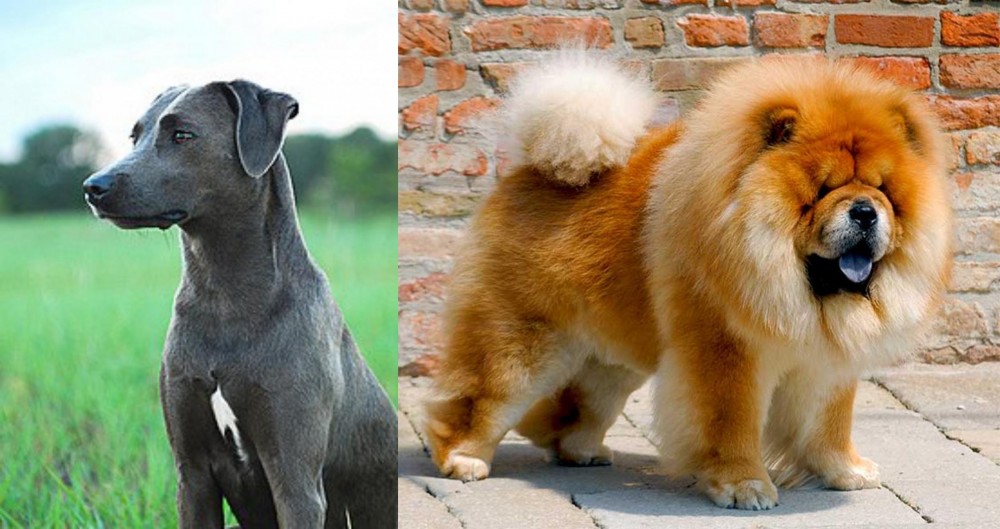 Blue Lacy is originated from United States but Chow Chow is originated from China. Both Blue Lacy and Chow Chow are having almost same height. Blue Lacy may weigh 9 kg / 19 pounds lesser than Chow Chow. Blue Lacy may live 3 years more than Chow Chow. Blue Lacy may have less litter size than Chow Chow. Blue Lacy requires Low Maintenance. But Chow Chow requires High Maintenance
Blue Lacy is originated from United States but Chow Chow is originated from China. Both Blue Lacy and Chow Chow are having almost same height. Blue Lacy may weigh 9 kg / 19 pounds lesser than Chow Chow. Blue Lacy may live 3 years more than Chow Chow. Blue Lacy may have less litter size than Chow Chow. Blue Lacy requires Low Maintenance. But Chow Chow requires High Maintenance
 The Lacy brothers came to Texas in 1858, and this breed is named after them. They wanted a strong, robust working dog. It is a working/herding dog breed that originated in Texas in the mid 19th century.
The Lacy brothers came to Texas in 1858, and this breed is named after them. They wanted a strong, robust working dog. It is a working/herding dog breed that originated in Texas in the mid 19th century.
It is interesting to note that in June 2005, Governor Rick Perry brought about legislation adopting the Blue Lacy as the official Dog Breed of Texas. The breed is also registered by the National Lacy Dog Registry and the Animal Research Foundation.
Today the Blue Lacy is considered to be the perfect all-around dog, with the Lacy family history noting the breed to come from a mix of scent-hound, greyhound and coyote cross. There are theories around the scent hound used, with some believing it could have been an Italian Gray Hound, but whatever the case, the Lacy brothers established this breed under the guidelines required to develop a recognized breed.
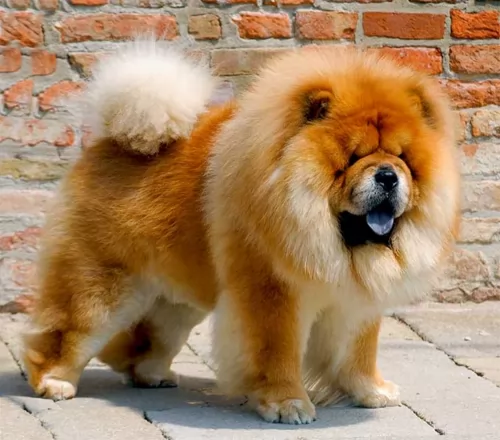 Northern China is the original home of the Chow Chow. In that region of China, the breed was known as the Songshi Quan – “the puffy-lion” dog. They have also been known in China as the “Dog of the Tang Empire” or the Tang Quan. The Chow is believed to be an ancient breed that the Foo Dog, or stone dog guardians of Buddhist palaces and temples, is modeled after. It is one of the most ancient of dog breeds that are still around today.
Northern China is the original home of the Chow Chow. In that region of China, the breed was known as the Songshi Quan – “the puffy-lion” dog. They have also been known in China as the “Dog of the Tang Empire” or the Tang Quan. The Chow is believed to be an ancient breed that the Foo Dog, or stone dog guardians of Buddhist palaces and temples, is modeled after. It is one of the most ancient of dog breeds that are still around today.
It is believed that they have existed for around 2000 years or perhaps even as far back as 3000 years, starting out in Mongolia and migrating to China. The ancientness of the Chow Chow has been validated through DNA testing. In China all those centuries ago, the Chow Chow was born to be a working dog. They hunted, herded, guarded and pulled carts. They went on quests with the Mongolian armies when China was invaded, as well as when the Mongolians invaded the Middle East and Europe later on.
Today’s Canadian Kennel Club has about 350 Chows registered while the AKC gets 10,000 new registrations every year.
 The medium-sized, well proportioned, muscular and lithe Blue Lacy stands at roughly 46–53cm. He has a coat which is smooth and short and in an attractive gun-metal gray color which can be classified as blue or almost black. Other shades are also available such as cream, yellow, reddish and you also get tri-colored Lacy’s.
The medium-sized, well proportioned, muscular and lithe Blue Lacy stands at roughly 46–53cm. He has a coat which is smooth and short and in an attractive gun-metal gray color which can be classified as blue or almost black. Other shades are also available such as cream, yellow, reddish and you also get tri-colored Lacy’s.
Pure Blue Lacy’s have some white markings on their brisket. Whatever color you have, these clean-looking dogs with their low maintenance coats are referred to as Blue Lacy’s. Their brown eyes are bright and alert, they have long tails and their ears hang down.
The American Blue Lacy gives one the sense of speed, agility and endurance. He is intelligent, active and alert, being an all-round dog who can adapt to being among ranchers and cowboys and then become gentle with children and his family.
With socialization, he is also tolerant of other dogs. Because he is so intelligent he can be quickly trained, and training and socialization will be recommended for him to ensure he is the perfect all-rounder he was designed to be. His alertness makes him an excellent watch dog.
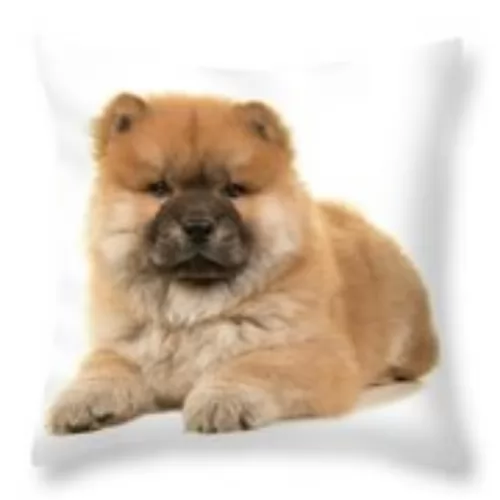 The Chow really does look like a small lion with a black tongue. The dog is sturdy and square with erect, small ears on a broad skull. They have a very dense double coat. Their eyes are deep set and look like almonds, while they all have that very distinctive purple or black tongue. Their lips are also distinctive with their blue color. The nose is black, but some Chows might have a blue nose. The tail is curly.
The Chow really does look like a small lion with a black tongue. The dog is sturdy and square with erect, small ears on a broad skull. They have a very dense double coat. Their eyes are deep set and look like almonds, while they all have that very distinctive purple or black tongue. Their lips are also distinctive with their blue color. The nose is black, but some Chows might have a blue nose. The tail is curly.
These are medium size dogs when it comes to height and weight, but they are powerfully built for their size. Their power is in their compact body holding the energy and strength of a much larger dog. Its hind legs are almost entirely straight, unusual for any dog. They get their lion appearance from the huge ruff that stands behind their heads. Their chest is broad and deep.
 Your Blue Lacy is such a low-maintenance, easy dog to have. Remember to have your puppy vaccinated from distemper, hepatitis, leptospirosis, parvovirus, and parainfluenza. These vaccinations start from 6 - 8 weeks of age. Also, because different areas have different regulations surrounding the rabies injection, check with your vet about this one.
Your Blue Lacy is such a low-maintenance, easy dog to have. Remember to have your puppy vaccinated from distemper, hepatitis, leptospirosis, parvovirus, and parainfluenza. These vaccinations start from 6 - 8 weeks of age. Also, because different areas have different regulations surrounding the rabies injection, check with your vet about this one.
A socialized, trained Blue Lacy makes such an awesome pet but you have responsibilities towards him. You need to know precisely what is required to keep him healthy and happy.
This is a versatile working dog who is intelligent and alert but also sensitive to being mistreated. Treat him decently and in exchange you’ll have a loyal, devoted canine family member.
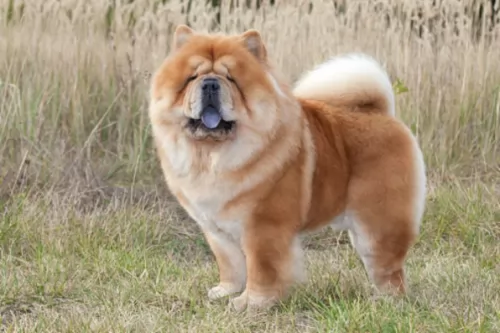 Loyal and true to their family and those they know; the Chow Chow is a little standoffish with strangers. They are very protective and usually attach themselves to one or two people. They are intelligent but stubborn, which can affect your training with them. They need to respect their people and Chows respect hose who take care of them. They can be aggressive toward dogs of their same sex especially if those dogs are the same breed as well.
Loyal and true to their family and those they know; the Chow Chow is a little standoffish with strangers. They are very protective and usually attach themselves to one or two people. They are intelligent but stubborn, which can affect your training with them. They need to respect their people and Chows respect hose who take care of them. They can be aggressive toward dogs of their same sex especially if those dogs are the same breed as well.
They are known to be very clean and many have compared them to cats in that regard. They appear to be dignified and refined. They are usually very quiet but very adaptable dogs.
 The Blue Lacy is generally a healthy breed, but just like with any other dog breed they will be prone to some health conditions. Blue Lacys can also suffer with the likes of hip or elbow dysplasia and hypothyroidism.
The Blue Lacy is generally a healthy breed, but just like with any other dog breed they will be prone to some health conditions. Blue Lacys can also suffer with the likes of hip or elbow dysplasia and hypothyroidism.
This is a disease of the hip where the ball and socket joint is malformed. Hip dysplasia is when the hip joints don’t develop normally. It needs to be watched as it can result in loss of function of the hip joints. The disease can often begin when the dog is still very young.
Some breeds are genetically predisposed towards hypothyroidism, but environmental factors and certain medications can trigger autoimmune reactions. Not only that, a tight collar can also cause thyroid damage. The symptoms of hypothyroidism are weight gain, skin problems, dislike of the cold and even hair loss and then it’s time to get your pet thyroid-tested.
 Although an ancient breed that obviously has survived many centuries of trials, the Cho Chow of today is prone to several different health conditions. These include:
Although an ancient breed that obviously has survived many centuries of trials, the Cho Chow of today is prone to several different health conditions. These include:
This condition can require surgery to keep the turning eyelid from injuring the eye ball.
This can cause lameness and arthritis.
This can cause lameness and arthritis.
Make sure you keep the ears clean and keep an eye on them.
 Typically of working breeds, the Blue Lacy is going to need a firm owner who provides guidance and leadership, and who is responsible with providing the Lacy with plenty of exercise. This dog was created for work, so they will be totally at home on a farm. If not, they will require long walks every day with lots of ball games too.
Typically of working breeds, the Blue Lacy is going to need a firm owner who provides guidance and leadership, and who is responsible with providing the Lacy with plenty of exercise. This dog was created for work, so they will be totally at home on a farm. If not, they will require long walks every day with lots of ball games too.
Care for the Blue Lacy doesn’t take much effort. He isn’t much of a shedder and therefore has low grooming requirements. He’ll require being brushed twice a week to get rid of loose hairs. If you start early with this grooming routine, he looks forward to this ‘bonding’ session.
Routine maintenance will require nail clipping and teeth cleaning as plaque can build up and leave your pet with dental problems and gum disease. Ask your veterinarian about dental care because there are special dog-designed toothpastes and brushes. Also check for ticks and fleas in and around the ears of your dog.
Your Blue Lacy is a high energy working dog so he will require a balanced diet to cater for his energy levels. He will certainly require some raw meat from time to time to avoid skin problems. Home prepared meals are also good and these can include rice, meat and vegetables.
Remember when in any kind of doubt, speak to your vet about dog food which meets the requirements of your dog, his age, his breed and his activity levels. Always have a bowl of clean, cool water available to him around the clock.
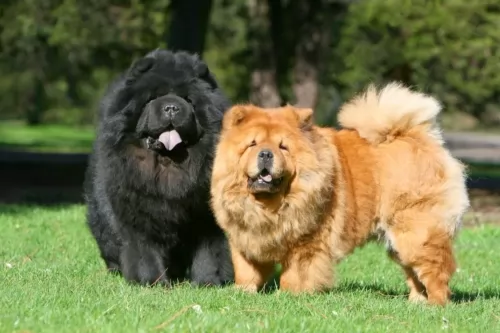 Don’t overfeed a Chow Chow as they are hard workers and big eaters. Feed them at least twice a day.
Don’t overfeed a Chow Chow as they are hard workers and big eaters. Feed them at least twice a day.
This eye disease can lead to blindness if not checked and treated.
These can be removed from an adolescent puppy.
Again, the Chow is susceptible to cancer.
Can lead to heart or kidney problems if left untreated.
Keep a close eye on your Chow Chow skin.
The Chow Chow was developed as working dog, but today’s version is more laid back and doesn’t need excessive exercise. Daily walks will suffice. They live very happily in the city if walked regularly. They are not really a competitive breed outside of obedience and confirmation. They are seldom seen in sports like agility or frisbee.